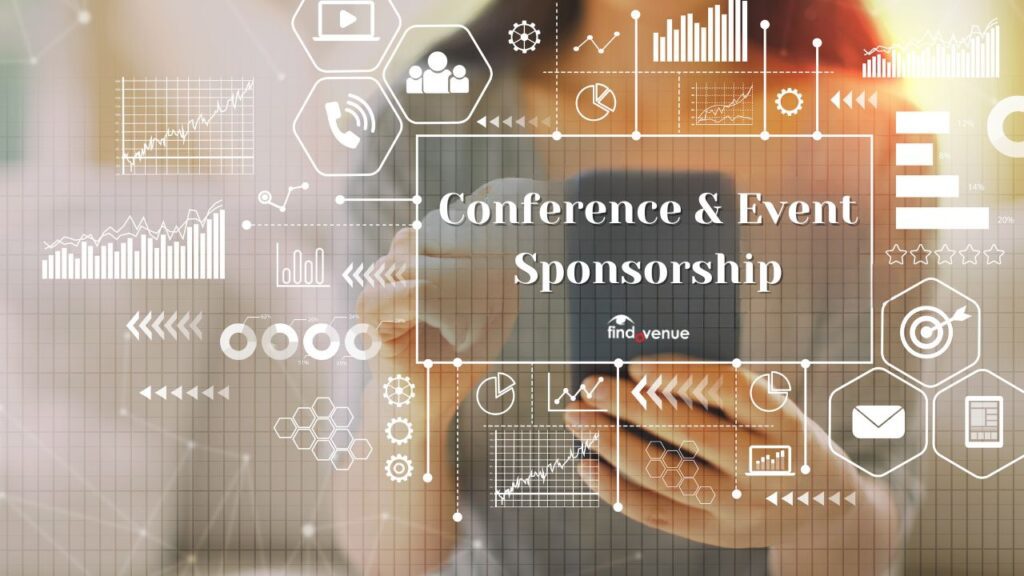The Complete Guide to Conference & Event Sponsorship:
Hosting a successful event requires meticulous planning and resources and event sponsorship can provide the financial support required to take your event to the next level. Securing sponsors and integrating them effectively into your event requires strategy and creativity.
In this guide, we’ll explore the essential steps and strategies for maximising the impact of event sponsorships, drawing from expert insights and practical tips.
Related: Streamline Conference Management with Advanced Technology
Understanding Conference and Event Sponsorship
Conference and event sponsorship involves partnering with companies or organisations that provide financial support in exchange for exposure and promotional opportunities at the event. This collaboration benefits both parties, with sponsors gaining brand visibility and event organisers receiving financial backing to enhance the event experience.

Benefits of Conference and Event Sponsorship
- Increased Event Budget: Conference and event sponsorship boosts the budget, enabling organisers to enhance the event experience with premium venues, high-quality production and innovative features.
- Enhanced Credibility: Partnering with reputable sponsors adds credibility to the event, attracting more attendees and securing top-tier speakers and participants.
- Expanded Reach: Sponsors help promote the event to their audience reaching new demographics and markets and amplifying marketing efforts across various channels.
By mastering sponsorship strategies, organisers can raise the profile their conference events, drawing in more attendees and crafting remarkable experiences that deeply connect with their target audience.
Types of Conference and Event Sponsorship
- Monetary Sponsorship: Sponsors provide financial support in exchange for promotional opportunities and brand exposure at the event.
- In-kind Sponsorship: Sponsors offer products or services instead of cash such as catering, venue space or promotional materials.
- Brand Sponsorship: Event organisers collaborate with sponsors to incorporate their brand into various aspects of the event such as logo placement and co-branded marketing materials.
Securing Conference and Event Sponsorship
- Know Your Event: Understand your event’s goals, target audience and unique selling points to identify potential sponsors that align with your vision.
- Understand Sponsors’ Needs: Tailor your sponsorship pitch to highlight how the event can benefit the sponsor, focusing on factors like brand exposure, lead generation and access to specific demographics.
- Identify the Right Partners: Focus on quality over quantity when approaching potential sponsors, seeking companies that share your event’s values and objectives.
- Use Online Tools: Leverage online platforms and resources to identify and connect with potential sponsors, streamlining the sponsorship acquisition process.
- Research Competitors’ Events: Explore sponsorship opportunities by analysing sponsor pages of similar events and identifying companies that have a history of sponsoring conference events in your industry.
Are you planning to Host a health research related event, workshop or conference in Ireland ? check out this article from the Health Research Board.

Crafting Compelling Conference and Event Sponsorship
- Visually Striking Visuals: Create unique visual installations and branding opportunities that captivate attendees and generate buzz on social media.
- Digital Experiences: Offer branded digital experiences such as interactive websites, live streams and virtual reality tours to engage attendees both on-site and online.
- Sponsor Lounges: Design branded lounge areas where attendees can relax, network and recharge. These areas provide sponsors with valuable exposure and engagement opportunities.
- Food and Drink: Partner with sponsors to offer branded food and beverage options, enhancing the attendee experience while promoting sponsor visibility.
- Speaker Sessions: Host sponsored speaker sessions, panel discussions and consultations to position sponsors as thought leaders in the industry and provide valuable content to attendees.
Pitching To Conference and Event Sponsors
- Know Your Potential Sponsors: Conduct thorough research on potential sponsors to understand their objectives, challenges and brand values before crafting your pitch.
- Show Value: Clearly communicate the benefits of sponsoring the event, emphasizing how the partnership can help achieve the sponsor’s goals and deliver a positive return on investment.
- Ask the Right Questions: During negotiations, ask questions that align with both parties’ objectives and ensure a mutually beneficial partnership.
- Use Social Proof: Highlight testimonials and case studies from previous sponsors to demonstrate the positive impact of event sponsorship and build credibility.
- Build Strong Relationships: Foster open communication and collaboration throughout the sponsorship process, establishing long-term partnerships built on trust and mutual success.

Maximising Conference and Event Sponsorship ROI
Pre-event promotion is crucial for building anticipation and maximising conference and event sponsor visibility. Organisers should collaborate closely with sponsors to develop tailored marketing strategies that highlight their involvement in the event. This can include:
- Social Media Campaigns: Leverage social media platforms to showcase sponsors’ participation through sponsored posts, hashtags and behind-the-scenes content. Encourage sponsors to share these posts with their own followers to extend reach.
- Email Newsletters: Include sponsor mentions and promotional materials in event-related email newsletters sent to attendees, partners and stakeholders. Highlight the value that sponsors bring to the event and provide incentives for attendees to engage with sponsor content.
- Press Releases: Issue press releases announcing sponsor and event partnerships detailing the benefits of sponsorship involvement. Distribute these releases to relevant media outlets and industry publications to generate buzz and attract attention to the event.
On-site activation offers sponsors the opportunity to directly engage with attendees and create experiences that reinforce brand messaging and drive conversions. Organisers should work closely with sponsors to design activations that align with their brand identity and event objectives.
This can include:
- Product Demonstrations: Set up dedicated spaces where sponsors can showcase their products or services to attendees. Provide opportunities for hands-on demonstrations, Q&A sessions and product trials to educate and engage potential customers.
- Giveaways and Contests: Host interactive giveaways and contests sponsored by participating brands. Encourage attendees to visit sponsor booths or interact with sponsor representatives for a chance to win prizes or exclusive experiences. These initiatives not only drive foot traffic to sponsor areas, but also encourages attendee participation and brand interaction.
- Interactive Exhibits: Create immersive exhibits and interactive installations that capture attendees’ attention and encourage active participation. This could include interactive games, photo booths, virtual reality experiences or live demonstrations that showcase sponsors’ offerings in a unique and memorable way.
Conference and event post-event follow-up is essential for maintaining momentum and demonstrating the impact of sponsors’ investment in the event. Organisers should provide sponsors with comprehensive post-event reports and analytics that highlight key performance metrics and ROI indicators.
This can include:
- Brand Exposure Metrics: Measure the reach and visibility of sponsor branding and promotional materials throughout the event, including signage, digital displays and online mentions. Provide sponsors with data on impressions, clicks and social media engagement to quantify their brand exposure.
- Lead Generation Analysis: Track and analyse leads generated through sponsor activations, booth visits and promotional activities. Provide sponsors with insights into the quality and quantity of leads captured during the event, which would include contact information and engagement metrics.
- Attendee Engagement Insights: Evaluate attendee engagement with sponsor content and activations, including session attendance, booth traffic and interaction levels. Share feedback and testimonials from attendees to demonstrate the effectiveness of sponsor messaging and engagement strategies.
By focusing on pre-event promotion, on-site activation and post-event follow-up, organisers can help conference and event sponsors maximise their ROI and achieve their marketing objectives. These strategies not only enhance the attendee experience, but also strengthen sponsor relationships and pave the way for future collaboration and partnership opportunities.

Evaluating Conference and Event Sponsorship Success:
Measure Key Metrics: Tracking and analysing key performance indicators (KPIs) is essential for evaluating the success of each sponsorship opportunity. These metrics provide valuable insights into the effectiveness of the sponsorship in achieving its objectives.
Here are some key metrics to consider:
Brand Visibility: Assess the visibility of sponsor branding and messaging throughout the event. This would include signage, logos and promotional materials. Measure factors such as impressions, reach and brand recall among attendees.
Lead Generation: Heighten the sponsor’s ability to generate leads and capture attendee interest during the event. Track metrics such as booth traffic, lead quality and conversions to assess the sponsorship’s impact on sales and business development.
Attendee Engagement: Measure attendee engagement with sponsor activations, experiences and content. Analyse metrics such as booth interactions, session attendance and social media engagement to gauge the level of audience interaction and interest.
Solicit Feedback: Gathering feedback from sponsors is crucial for understanding their satisfaction level and identifying areas for improvement in future partnerships.
Here are some methods for soliciting feedback:
Surveys: Create post-event surveys or questionnaires to collect feedback from sponsors regarding their overall experience, satisfaction with sponsorship benefits and suggestions for improvement. Include both quantitative ratings and open-ended questions to gather detailed insights.
Interviews: Conduct one-on-one interviews or focus group discussions with sponsors to delve deeper into their feedback and perspectives. Encourage sponsors to share their challenges, successes and recommendations for enhancing future sponsorships.
Adjust Strategies: Using insights from sponsorship evaluations, it’s important to adapt and refine your sponsorship strategies for future events.
Here are some strategies for adjusting your approach based on feedback and performance metrics:
Refine Sponsorship Offerings: Tailor sponsorship packages and offerings based on sponsor feedback and performance data. Identify opportunities to enhance value propositions, customise benefits and address sponsors’ specific objectives and preferences.
Enhance Activation Opportunities: Develop new activation opportunities and experiences that align with sponsors’ goals and resonate with attendees. Incorporate innovative ideas, technology integrations and interactive elements to create successful sponsor activations that drive engagement and brand awareness.
Strengthen Communication and Collaboration: Foster open communication and collaboration with sponsors throughout the sponsorship lifecycle. Proactively engage sponsors in the planning process, provide regular updates and support during the event and solicit feedback for continuous improvement.
Foster Long-Term Relationships: Focus on building long-term relationships with sponsors based on trust, transparency and mutual value. Invest in nurturing existing sponsorships, cultivating loyalty and exploring opportunities for ongoing partnership and sponsorship renewal.
By evaluating sponsorship success through comprehensive metrics analysis and feedback collection, organisers can refine their sponsorship strategies, strengthen sponsor relationships and drive continued success and growth in sponsorship revenue.
Summary
Conference and event sponsorship offers a wealth of opportunities for event organisers to enhance their events, reach new audiences and create exceptional experiences.
By following the steps outlined in this guide and leveraging strategic partnerships with sponsors, event organisers can maximise the impact of sponsorships and achieve their event goals.
With careful planning, creativity and collaboration, event sponsorship can be a valuable asset in creating successful events.
Picking the right conference venue might seem overwhelming. For helpful tips in this area, click the link which outlines a details on the conference venue selection process.
Searching for the best conference venues in Dublin ? Check out one of our latest blog which highlights 11 amazing conference venues suitable for the most discerning of events.
